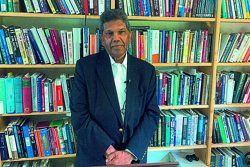MUMBAI, (Reuters) – International Cricket Council (ICC) Chief Executive David Richardson predicted an open World Cup yesterday, saying the associate members are well prepared to upset major teams in the tournament.
Four second-tier nations — Afghanistan, Ireland, United Arab Emirates and Scotland — will join the 10 full members for the 11th edition of the tournament from Feb. 14-March 29.
While Ireland stunned Pakistan and England at the 2007 and 2011 World Cups respectively, minnows Afghanistan defeated Bangladesh in their first win over a test-playing nation last year.
The ICC arranged a familiarisation tour of Australia for them last year during which they played matches against local sides to gain much-needed experience of the conditions Down Under.
The governing body also appointed Dav Whatmore, who coached Sri Lanka to their 1996 World Cup win, to help the four minnows prepare for the tournament in Australia and New Zealand.
“The associates and the way they are prepared for this tournament, any other country will be silly to take them lightly,” Richardson told Reuters in a telephone interview.

“If they do, there’s a real chance of an upset being caused. They will be the underdogs in most of the matches but a surprise or two can impact the group standings.
“If you are South Africa, they will want to make sure they finish top of the group because they would want to avoid a difficult quarter final. Any upset will have profound effect on the tournament,” said the former Proteas stumper-batsman.
The 14 teams have been divided into two groups for the World Cup with four teams from each pool advancing to the knock-out stages.
The 55-year-old Richardson is confident the upcoming tournament would eclipse all the earlier editions and the new playing conditions would further lift the standard of the game.
Two new balls and an extra fielder inside the circle during the non-powerplay overs will be used for the first time in a World Cup which, Richardson hopes, will also encourage attacking cricket.
“The use of two new balls will give the seam bowlers a chance and the fielding restrictions changed the one-day game quite considerably,” said Richardson.
“It’s much more attacking and there are many more boundaries scored. The old days of trying to contain batsmen and bowl dot balls is becoming very difficult and the only way of containing scoring is to attack and try and get wickets.
“So we are seeing a far less of those predictable games where it follows a pattern.”
It also means there were no clear favourites this time for Richardson.
“What is great about this event is that probably for the first time ever, with due respect to the other teams, at least six of the teams realistically have a chance of winning the tournament,” he said.
“That’s never been the case. There have always been one or two really strong favourites going into the event. Yes there have been surprises from time to time but in this case on their day any of the teams can beat any other team.”









